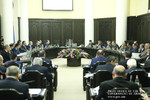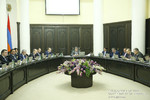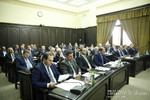Thursday, 22 February 2018
Government Set to Ease Administration for Law-Abiding Taxpayers and Reduce Tax Shadow Risks
A Cabinet sitting was held today, chaired by Prime Minister Karen Karapetyan. Before proceeding to the agenda, the Prime Minister issued a number of instructions.
The Premier’s first instruction was about the tax shadow-associated risks and other topical issues. “In 2017, State budget revenues increased by nearly 125 billion drams as compared to 2016, Notwithstanding, it should be noted that there are still some problems associated with tax shadow risks, poor legislative adjustments, tax avoidance or artificial reduction, as well as clear and purposeful use of tax benefits. In view of the above, the State Revenue Committee recently held meetings with more than 500 taxpayers in 18 sectors and conducted relevant surveys. As a result, the solutions to the aforementioned problems, including the ones related with the tax shadow, have been placed under the jurisdiction of a number of other agencies,” Karen Karapetyan said.
With this purpose, the Head of Government told the Chairman of State Revenue Committee by the Government of the Republic of Armenia to draft a per-sector breakdown of existing problems within 7 days and forward it to the heads of central executive agencies along with proposals on their possible solution.
The Chief of Government Staff was instructed to develop and submit within 10 days a draft decision on establishing an interdepartmental working group, specifying that the working group will shortly submit proposals to the Government Staff on easing administration with respect to law-abiding taxpayers, reducing tax shadow-related risks, revising fuzzy regulations, streamlining the application of tax benefits and addressing systemic problems. “A primary condition for all decisions should be to facilitate the life of law-abiding taxpayers,” Karen Karapetyan emphasized.
The Prime Minister’s next instruction had to do with the complaints submitted under administrative lawsuits, as well as with the town-planning standards applicable to healthcare facilities. The relevant government decisions will provide land users with fertilizers, seeds and diesel fuel at affordable prices.
The meeting approved the Natural Resources Management Strategy of the Republic of Armenia. The proposed solutions will provide an opportunity to implement reforms aimed at ensuring sustainable management in the field of natural resources. According to the Minister of Energy Infrastructures and Natural Resources Ashot Manukyan, for the first time the document calls for mandatory processing of waste generated as a result of subsoil use. The Government established requirements to reduce environmental damage due to subsoil use, the implementation of planned monitoring in order to prevent irreversible consequences, as well as the procedure for reporting results.
The meeting endorsed the Government’s legislative initiative in the form of a bill on amending the RA Law “On electronic communications.” The draft law provides that “the operator or service provider has the right, in the manner prescribed by the regulator, to disclose information about the place of use of the service by its client (client’s geo-location) and the client’s personal data when making calls (sending messages) to emergency response numbers 112 (911) and the Police hotline of 102.
The Executive next approved the Government’s legislative initiatives in the form of relevant bills referred to as “On Amending the RA Criminal Procedure Code” and “On Amending the Administrative Procedure Code of the Republic of Armenia.” The bills are meant to bring the above Codes into conformity with the constitutional law “On RA Judicial Code.”
The government adopted a corresponding resolution based on the need to update and adjust the norms established in some legal acts regulating the non-tariff sphere subject to regulation by Armenia’s internal legislation and based on its EAEU membership, as well as the regulation of a number of issues that arose in the process of enforcement. The resolution streamlines the relationships arising from the possibility of issuing permissions to individuals for importing into and exporting from the Republic of Armenia specific types of goods subject to non-tariff regulation.














